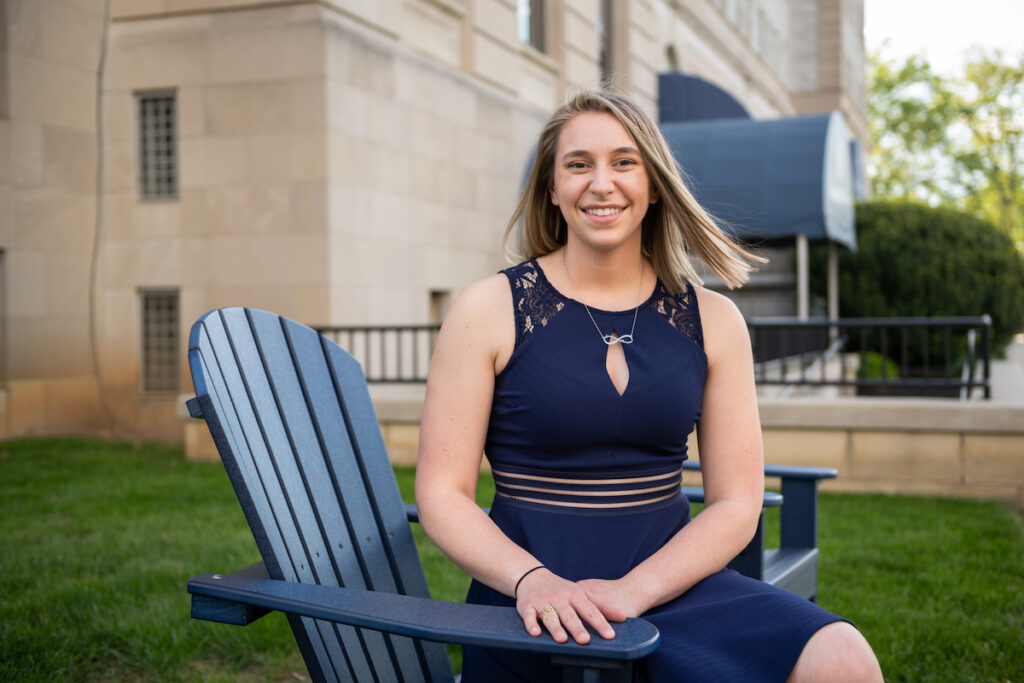Immaculata News
Theresa Walsh

Before the pandemic, Theresa Walsh ’18, M.S. ’21, a radiologic technologist at Johns Hopkins University Hospital in Baltimore, mainly encountered kids who fell off bikes or someone who slipped on the ice and fractured a wrist. However, once COVID-19 hit there were less broken bones to X-ray; everyone stayed home. Only a few essential workers ventured out in the early stages of the pandemic––including Theresa and her colleagues. She shifted from broken bones to patients with coughs, shortness of breath and chest pain—all COVID-19 symptoms.
Suited up in a powered air purifying respirator (PAPR), Theresa now took portable radiological machines to the patients’ rooms to minimize cross-contamination. Wearing the PAPR, which typically weighs about 4 ½ pounds, added extra difficulty during a 12-hour shift that was already taxing under normal circumstances.
“I was extremely stressed with COVID,” Theresa admits. “I would exercise or go on a run to help cope.” She also talked to her lifelong friends from Immaculata, which would cheer her up. “Everyone was going through it [COVID-19],” she says.
She recognized that being able to get up, go to work and not have to work remotely or “look at the same four walls all day, every day” provided her with a sense of comfort and familiarity.
When she was researching undergraduate colleges, she knew she wanted to study radiology at Johns Hopkins. Delving into their program closer, she learned that they had a partnership with Immaculata, which was only a 30-minute drive from her home in Pottstown, Pennsylvania.
It was important to Theresa to continue playing sports in college, but she knew academics needed to be the priority. As an allied health major, she found the workload manageable and became a vital member of the basketball and track and field teams. Theresa graduated with a Bachelor of Science in Allied Health in 2018 through the 3+1 program that sent her to East Baltimore Medical Center of Johns Hopkins University for her senior year. After graduation, she was offered a position as a radiological technologist there.
During her three years at Immaculata as an undergraduate student, Theresa grew to admire and appreciate her advisor, Anne Marie McCauley, D.H.Ed., associate professor of allied health. She commented that Dr. McCauley is constantly improving the program to benefit the students. Because of her excellent undergrad experience, Theresa enrolled in the Master of Science in Health Care Management Program; she graduated in May.
Living outside Baltimore, the program’s online delivery format fit her needs with two back-to-back classes per semester that was perfect for her full-time job. She found that working in the medical field while taking classes helped her understand and relate better to the assignments and discussions. During one class that focused on emergency situations and how to manage them, Theresa and her classmates discussed an active shooter scenario. Not long thereafter, she was able to relate some of those new skills to the emerging COVID-19 crisis. Although no two crisis situations are the same, one common thread is that typically no one knows what is going to happen next—so planning and preparation are vital. As a healthcare professional, all of Theresa’s actions were centered around providing high-quality patient care while maintaining each patient’s health and safety.
Having lived through the worst of the pandemic in a hospital environment, life seems to be returning to normal. This past January, Theresa was transferred to imaging tech in the cardiac catheterization lab working with heart patients. Although she misses the green open spaces of Pennsylvania, she is adjusting to her new environment.
When Theresa returned to Immaculata for her graduation this past May, she realized why she originally decided to attend. Not only does she appreciate the beautiful campus, but she finds a sense of comfort and peace on the campus.